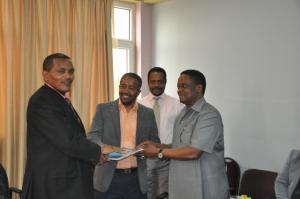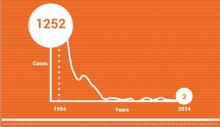Running the Last Lap to End Guinea Worm Disease in Ethiopia
The final lap of a distance race is often the most difficult one, but in a land of runners – like Ethiopia – it is not as daunting as one might assume. The finish line
is within sight and the medal is dangling in the air, everything is possible with the right determination and perseverance.
Ethiopia has been running the race to
eradicate guinea worm disease with great determination for the past 22 years. Today the finish line is closer than ever before. The number of cases has reduced more
than 99% since the beginning of the Ethiopian Dracunculiasis Eradication Programme (EDEP), from 1,252 in 1994 to only 3 cases in 2014. There have been no cases in
2015. With this achievement, the country has positioned itself to stop indigenous transmission of the disease by the end of 2015.
But Ethiopia has not been running
alone; the World Health Organization has been a core member of the EDEP team led by the Federal Ministry of Health together with The Carter Center (TCC), UNICEF and
Centers for Disease Control (CDC) since the start of the race in 1994. WHO’s support to the Ethiopian Dracunculiasis Eradication Programme has focused on strengthening
surveillance, documentation and raising public awareness of the disease and the cash reward offered for voluntary reporting.
On 1 April 2015, WHO passed the baton to
The Carter Center for the last lap of the race, as the division of labour between the two organizations for assisting the EDEP changed. The Carter Center took full
responsibility for providing financial support for active surveillance in Ethiopia, as well as nationwide awareness raising. WHO will now focus on its normative and
coordination role, including monitoring the implementation towards the International Commission for the Certification of Dracunculiasis Eradication. The official
handover ceremony was held at the Federal Ministry of Health on 6 April 2015 in the presence of Dr Kebede Worku, State Minister of Health, Dr Zerihun Tadesse
Gebrelassie, The Carter Center Country Director, Dr Pierre M’Pele-Kilebou, WHO Representative to Ethiopia, and Dr Teshome Gebrie, Chairperson of the National
Certification Committee.
Currently only four countries in Africa – Chad, Ethiopia, Mali and South Sudan – are reporting cases of dracunculiasis. For the whole of 2014
globally, a total of 126 cases were reported to WHO, compared with 148 in 2013. Indigenous transmission of Guinea worm disease has been interrupted in the Southern
Nations Nationalities and Peoples region of Ethiopia since 2001, but low intensity transmission continues in Abobo and Gog districts of Gambella region.
For more
information, please contact:
Dr Zeyede Kebede Zeleke,
Email: %20zelekez [at] who.int (zelekez[at]who[dot]int)
Photo: WHO Ethiopia/V. Erkkila





